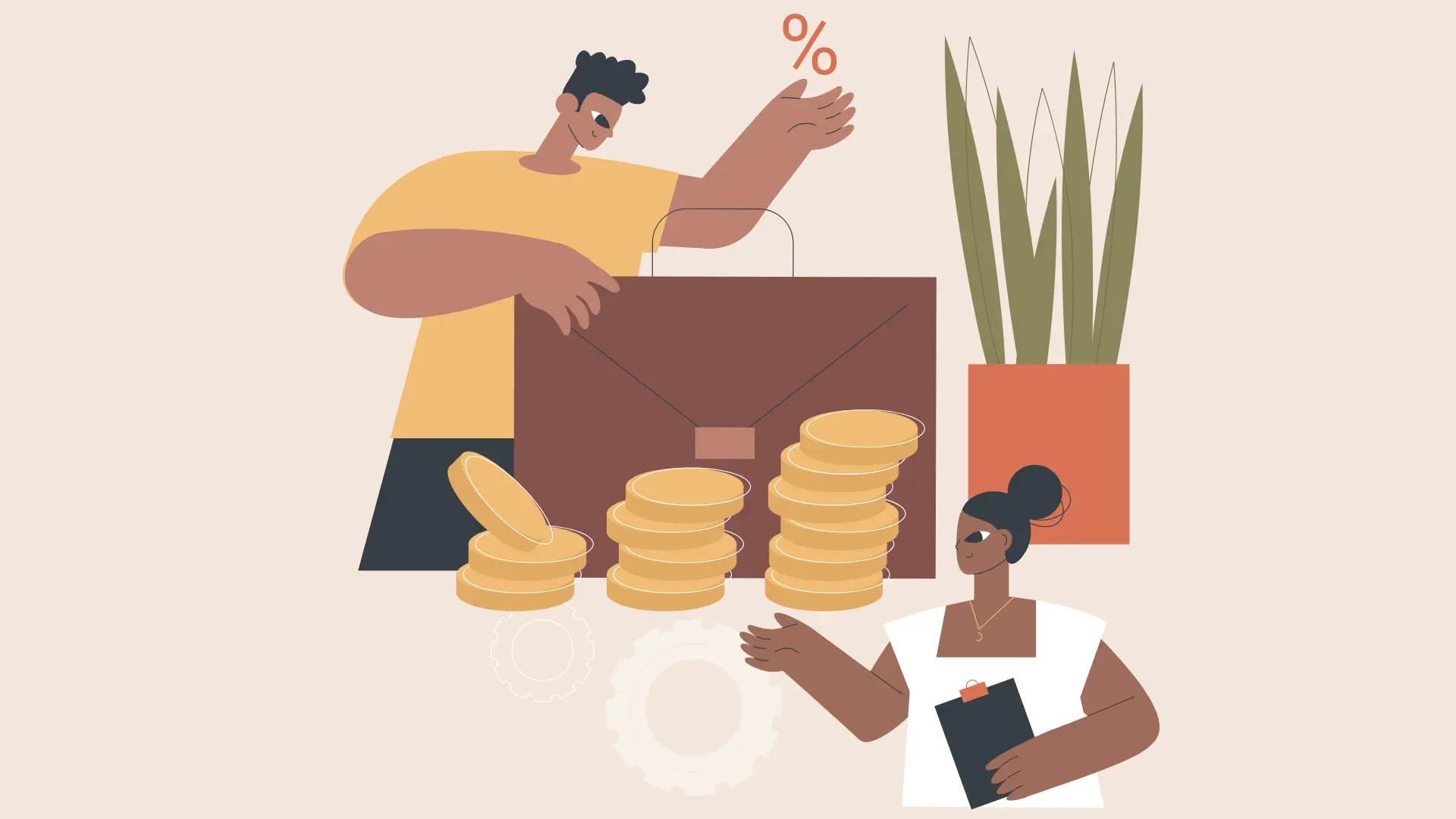Recession-Proof Your Investments
As the economy continues to struggle, many people are asking themselves what they can do to protect their investments. While it’s important to do your research and stay up-to-date on economic news, there are a few simple things you can do to help protect your money in tough times. Sure, when the economy goes into a recession, it can be difficult to see the light at the end of the tunnel. But, don’t panic, there are steps you can take to protect your investments in good times and bad. We will discuss them in this article.
What Recession-Proofing Means
Recession-proofing is the act of preparing a business or individual for an economic recession. This can be done through a variety of methods, including reducing expenses, increasing productivity, and investing in assets that will retain value even in tough economic times. By taking these steps, an individual or a business can insulate itself from the negative effects of a recession and continue to operate smoothly.
Types of Recession-Proof Investments
There are many types of recession-proof investments that can help protect your portfolio from market volatility. While some investments are more recession-proof than others, it’s important to remember that no investment is 100% safe. In any case, some of the most popular and time-tested recession-proof investments include:
1. Diversified mutual funds – A diversified mutual fund is a great way to spread your money around and reduce your risk. When the stock market takes a dive, mutual funds often do not suffer as much as individual stocks.
2. Bonds – Bonds are another popular investment choice for those looking for stability during tough times. Unlike stocks, bonds usually do not fluctuate as much in value and provide a steady stream of income.
3. Gold and other precious metals – Gold and other precious metals can be a good investment choice during times of economic uncertainty. Gold and other precious metals are not volatile and have a long history of protecting wealth.
4. Certificates of deposit – Certificates of deposit (CDs) are investment vehicles that offer a higher yield than traditional savings accounts, but with the security of a federally insured bank account. They are also federally insured by the FDIC up to $250,000. CDs are offered by banks, thrifts, and credit unions, and can be for a variety of terms, from a few months to several years. The longer the term of the CD, the higher the yield.
5. Annuities – An annuity is a financial product that pays out a fixed sum of money to its holder every year. It is typically used as a retirement savings vehicle, as it allows people to draw a consistent income in retirement without having to worry about the ups and downs of the recession and/or an investment such as the stock market. Annuities can be purchased from insurance companies, and there are a variety of different types available, each with its own set of features and benefits.
How To Choose the Right Investment
There are a few key factors to consider when choosing a recession-proof investment. The first is stability. You want an investment that is likely to remain stable, even in tough economic times. The second factor is growth potential. You want an investment that has the potential to grow, even in a recession. The third factor is liquidity. You want an investment that is easy to sell, if needed. Finally, you should consider your risk tolerance and investment goals when choosing a recession-proof investment.
Reasons to Recession-Proof Your Investments
There are a number of reasons to recession-proof your investments.
First, by investing in assets that are likely to hold their value or even increase in value during a recession, you can minimize the losses that you would suffer if the economy entered into a downturn.
Second, even if you do not think that there is going to be a recession, it is always prudent to have some recession-proof investments in your portfolio in case one does occur.
Third, by investing in recession-proof assets, you can help to protect yourself from the potential negative consequences of a recession, such as job loss and reduced income.
Tips for Recession-Proofing Your Investments
There are a few key things to keep in mind when recession-proofing your investments. Among the most important is considering investments in assets that are not as closely tied to the economy, such as gold or real estate. Other tips that will help you in the recession-proofing of investments are listed below.
1. Stick to Low-Risk Investments – The safest way to ensure your investments are protected during a recession is to stick to low-risk options. This means investing in stable companies with a proven track record, rather than gambling on high-risk startups or penny stocks. Keeping your money in low-risk investments will help you avoid losing any of it during a downturn in the economy.
2. Review Your Portfolio and Make Changes As Needed – In order to recession-proof one’s investments, one should regularly review their portfolio and make changes as needed. This is sound advice, as it allows an investor to stay ahead of any potential market downturns. Additionally, by making changes to one’s portfolio when necessary, an investor can potentially minimize any losses suffered during a recession.
3. Diversify Your Investments – One way to recession-proof your investments is to diversify them across a range of different asset types. This can include everything from bonds to commodities and real estate. By spreading your money around, you can help minimize your risk if one particular type of investment falls in value. Additionally, if you have a diverse portfolio, you may be less likely to panic and sell during times of market volatility.
4. Diversify Your Portfolio – The rationale for diversifying one’s investment portfolio is to protect the individual from the risks associated with investing in any one particular security or asset class. By spreading one’s money across a variety of stocks, ETFs, etc., the risk of experiencing a significant loss is reduced. In addition, by owning assets that are not correlated, the overall volatility of the portfolio can be reduced, providing stability during periods of market turbulence.
5. Consider Alternative Investment Opportunities – Alternative investment opportunities include hedge funds, private equity, and venture capital. These investment opportunities can help to recession-proof your portfolio by providing diversification and potential returns that are not correlated with the stock market.
6. Have a Strategy, and Stick to It – A key strategy for recession-proofing your investments is to have a plan and stick to it. This means that you should avoid being swayed by market volatility and instead focus on your long-term goals. By remaining disciplined, you can minimize the risk of losing money in a downturn and maximize the potential for growth when the market rebounds. This means being strategic in your choices, and not being swayed by short-term market fluctuations as that you can weather any economic storm.
7. Hedge Your “Bets” – This phrase is a way of saying that you should not put all of your eggs into one basket, especially if that basket is likely to be affected by a recession. This is because investments that are tied to the performance of the economy, such as stocks, are likely to perform worse during a recession than those that are not. By spreading your money out among a variety of different types of investments that are not tied to the economy, such as those mentioned in the paragraph “Types of Recession-Proof Investments,” you reduce the risk that you will lose everything if the economy takes a turn for the worse.
8. Stay Informed: Keep an Eye on the Market – The saying “stay informed, keep an eye on the market” is a tip for recession-proofing your investments. It means that if you stay up to date on the news and keep track of what is happening in the stock market, you can make more informed choices about where to put your money. This can help to protect investments against potential downturns in the economy, since investors will be able to react more quickly to changes in the market. It is also important to remember that no one can predict the future, so it is still important to have a diversified portfolio that includes both stable investments.
9. Stay Informed: Keep an Eye on the News – We also recommend staying informed and keeping an eye on the news as a tip for recession-proofing your investments. We advise readers to watch for indicators such as falling housing prices, increasing unemployment, and a slowdown in consumer spending. By being aware of these indicators, investors can make more informed decisions about where to allocate their money. For example, if the market is indicating that a recession is likely, investors may want to consider shifting their money into safer investments such as government bonds, certificates of deposit, or gold. Additionally, following financial news outlets can help investors stay ahead of any potential market crashes.
10. Choose Recession-Proof Sectors – There is no one-size-fits-all answer to the question of which sectors are recession-proof, as the strength of different sectors can vary depending on the specific economic conditions. However, some sectors are typically seen as being more resistant to recessions than others, such as healthcare, utilities, and consumer staples. These sectors are often referred to as “recession-proof” because they tend to hold up better than others in times of economic decline. These sectors are considered “recession-proof” because people will always need to eat, drink water, and stay warm, even during tough economic times. Investors can choose to allocate their money to these sectors as a way to protect their portfolios from potential downturns in the economy.
11. Buy Some Real Estate – The idea behind buying real estate as a tip for recession-proofing your investments is that, by investing in a physical asset that is not correlated with the stock market, you can help to protect your portfolio from the negative effects of a recession. In addition, by buying real estate in a location that is likely to experience strong population growth in the coming years, you can further reduce the risk of your investment declining in value.
12. Have a Liquid Savings Account – A liquid savings account is one that can be accessed easily and quickly, without having to wait for a lengthy approval process. This type of savings account can be helpful during times of economic recession, when it may be difficult to sell investments or access other forms of capital. By having a liquid savings account as a backup plan, you can help protect yourself from downturns in the economy. It can also prevent you from having to sell your investments at a giveaway price just to be able to have access to some cash.
13. Talk to a Financial Advisor – A financial advisor can help you to recession-proof your investments by creating a diversified portfolio that will be less susceptible to downturns in the market. They can also help you to stay disciplined with your spending and save for a rainy day. By working with a financial advisor, you can often be sure that your investments are protected against economic volatility. They can also help you plan for future expenses and save for retirement.
14. Invest in Bonds – When the economy is doing well, stocks are the best investment option because they offer the potential for high returns. However, when the economy is struggling, bonds become a more attractive option because they are less risky and offer more stability. By investing in bonds during times of economic recession, you can help to protect your portfolio from market fluctuations and ensure that your investments are still performing well even when the rest of the market is struggling.
15. Cut Costs Where You Can – Cutting costs can be a great way to recession-proof your investments. When money is tight, it’s important to find ways to save wherever you can. This may mean scaling back on luxuries such as eating out or vacations, and instead focusing on reducing expenses in areas like housing, transportation, and utilities. By doing this, you’ll have more money as a sort of a cushion to fall back on if the economy takes a turn for the worse.
16. Invest in Assets that Hold their Value – One way to recession-proof your investments is to invest in assets that hold their value. Assets like gold, silver, and diamonds are a good choice because they tend to maintain their value even during tough economic times. This is especially important if you’re worried about losing money during a recession. By investing in assets that hold their value, you can help protect your portfolio from market fluctuations.
17. Have a Plan B – One way to recession-proof your investments is to have a plan B. This could involve investing in assets that are less correlated with the stock market, such as commodities or real estate. Alternatively, you could increase your exposure to defensive stocks, which tend to perform better during recessions. You could also consider adding some short-term debt instruments to your portfolio, such as Treasury bills or short-term bonds.
18. Know Your Net Worth – The phrase “know your net worth” is a financial term that means understanding the value of all of your assets – including savings, checking, investments, and property – minus any debts you may have. This figure can help you gauge how recession-proof your investments are, as well as give you an idea of how much cushion you have in case of tough times. Knowing your net worth can also help you make more informed decisions about where to allocate your money. If you have a negative net worth, your investments may be at risk if the economy weakens and you are unable to repay your debts. Now may be the best time to start to work on that.
19. Have an Emergency Fund – An emergency fund is important for protecting your investments from potential economic downturns. By having a cushion of cash saved up, you can avoid having to sell investments at a loss during a recession. Having an emergency fund also allows you to maintain your standard of living in the event of job loss or other financial hardship. Having an emergency fund will also help you avoid taking on high-interest debt, which can further damage your finances during tough times. To build an emergency fund, you should start by setting aside money each month until you have saved up enough to cover several months’ worth of expenses.
20. Invest in Yourself – The best way to recession-proof your investments is to invest in yourself. This means continuing your education, learning new skills, and staying up to date on the latest trends in your industry. By doing this, you will make yourself more valuable and recession-proof your job security. You will also be in a better position to take advantage of opportunities when they arise. Remember, this not only means keeping your skills up-to-date, but it also means being open to new opportunities.
What To Do if You’re Already in Debt: Tips for Those Struggling Financially
If you are already in debt, there are a few things you can do to try and get yourself back on track. First, start by consolidating your debts into one loan with a lower interest rate. This will make it easier to keep track of your payments and will save you money in the long run. You should also consider investing in a good savings plan or mutual fund so that you have money saved up in case of an emergency. Additionally, be sure to create a budget and stick to it as best as possible. This will help you keep track of your spending and ensure that you are not over-extending yourself financially.
And lastly, you may want to consider getting a second job. There are a few reasons why someone might get a second job if they are struggling with debt. One reason is that having two jobs will help you to get out of debt faster. Another reason is that it will help you to save money and get your finances in order. Additionally, having a second job may help you to reduce your stress levels and improve your overall quality of life.
Conclusion
In conclusion, by following the tips provided, you can recession-proof your investments and maintain a positive portfolio during these uncertain times. Diversify your portfolio, invest in stable companies, and keep an eye on the market – but don’t be afraid to take calculated risks when the time is right. Also, remember, stay calm and don’t panic during a recession.
If you follow these tips, you’ll be able to weather the storm and come out on top.













